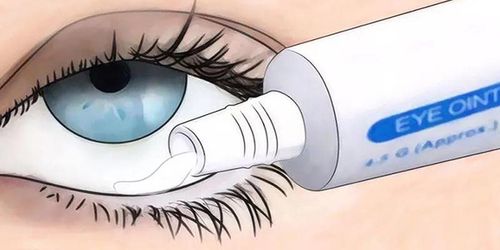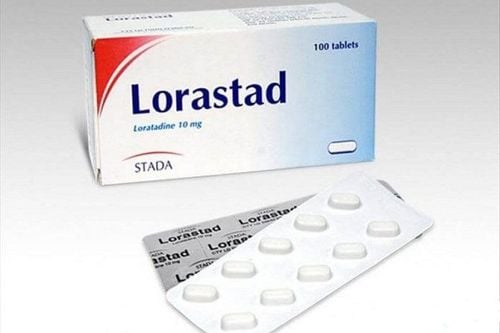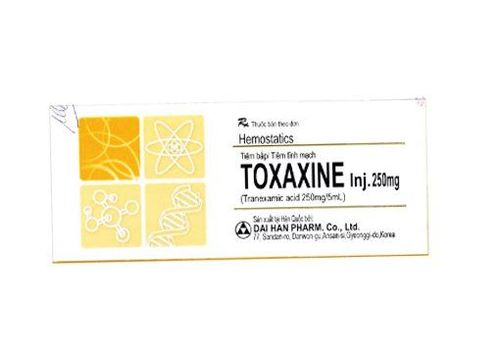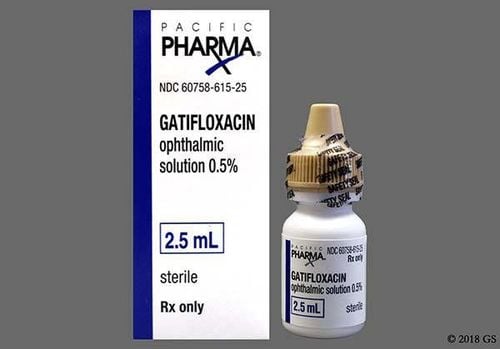This is an automatically translated article.
Cyproheptadine is a prescription medicine used to treat allergy symptoms such as runny nose, itchy eyes, sneezing, hives, and itching. Cyproheptadine is used in a similar way to other popular antihistamines.
1. What is Cyproheptadine?
Cyproheptadine is an antihistamine and is used to relieve symptoms of seasonal allergies, such as skin rashes, itchy or watery eyes, and runny nose.
Besides, this drug is also used to stimulate appetite and promote weight gain.
2. What does Cyproheptadine do?
Cyproheptadine is effective in the following cases:
Allergic rhinitis; Vasomotor rhinitis ; Allergic conjunctivitis ; Mild allergies; Urticaria due to cold ; Venereal diseases. As adjunctive anaphylaxis therapy to epinephrine and standard measures after acute manifestations have been controlled. However, Cyproheptadine is contraindicated when administered to the following subjects:
Newborns or premature babies; Breastfeeding mothers ; Hypersensitivity to Cyproheptadine and other drugs with similar chemicals; monoamine oxidase inhibitor therapy; Angle-closure glaucoma; Peptic ulcer; Symptomatic prostate enlargement; Bladder neck obstruction; Duodenal obstruction; Elderly and debilitated patient.
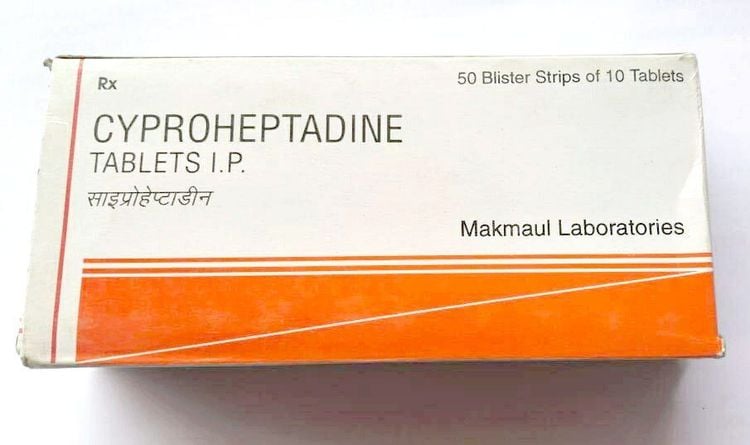
Cyproheptadine là một trong các một loại thuốc kháng histamin đang được sử dụng hiện nay
3. How to take Cyproheptadine
Each tablet contains 4mg of Cyproheptadine hydrochloride and can be taken with or without food. However, it should be taken with food if you have an upset stomach. Dosage should be individualized to each patient's needs and effectiveness.
For pediatric patients 2 to 6 years of age: The total daily dose for pediatric patients can be calculated on the basis of body weight or area used approximately 0.25 mg/kg/day or 8 mg per 2 square meters of body surface (8 mg/m2).
Thus, the usual dose is 2 mg (1/2 tablet) orally 2 or 3 times a day, adjusted for patient size and response but the dose should not exceed 12 mg per day.
For pediatric patients 7 to 14 years of age: The usual dose is 4 mg (1 tablet) 2 or 3 times a day adjusted for patient size and response but the dose should not exceed 16 mg per day. day.
For adults: Treatment is in the standard range of 4 to 20 mg a day, with most patients requiring 12 to 16 mg a day.
The recommended dosing regimen is to start with 4 mg (1 tablet) 3 times a day and be adjusted according to body size and patient response.

Người bệnh nên dùng cyproheptadine theo đúng hướng dẫn
4. Warnings when taking Cyproheptadine
Overdosage of Cyproheptadine can impair mental alertness, produce hallucinations, central nervous system depression, convulsions, respiration, cardiac arrest, and death. In rare cases may produce irritating reactions.In addition, antihistamines can have side effects with alcohol and other CNS depressants, such as antidepressants, sleeping pills, tranquilizers or anti-anxiety drugs. Therefore, when taking Cyproheptadine, patients should be warned about engaging in activities that require mental alertness and alertness, and good motor coordination, such as driving a car or operating machinery.
In addition, antihistamines are more likely to cause dizziness, sedation and hypotension when used in elderly patients.
5. Undesirable effects when taking cyproheptadine
The following adverse reactions have been reported with the use of cyproheptadine:
On the central nervous system: Sedation and somnolence (usually transient), dizziness, coordination disorders, confusion , restlessness, agitation, anxiety, tremor, irritability, insomnia, paresthesia, neuritis, convulsions, euphoria, hallucinations, hysteria, lethargy. Other side effects: Acute labyrinthitis, blurred vision, double vision, dizziness, tinnitus, anemia, decreased white blood cell lines, platelets, cholestasis, liver failure, hepatitis, impaired liver function , dry mouth, epigastric pain, loss of appetite, nausea, vomiting, diarrhea, constipation, jaundice, dry nose and throat, bronchial secretions, angina, wheezing, nasal congestion, fatigue fatigue, chills, headache, appetite, weight gain. In summary, Cyproheptadine helps relieve allergy symptoms, such as hay fever and some allergic skin conditions. Although everyone can buy Cyproheptadine tablets without a prescription, they need to be used with caution, following the correct dosage, especially in young children to avoid unwanted effects.




